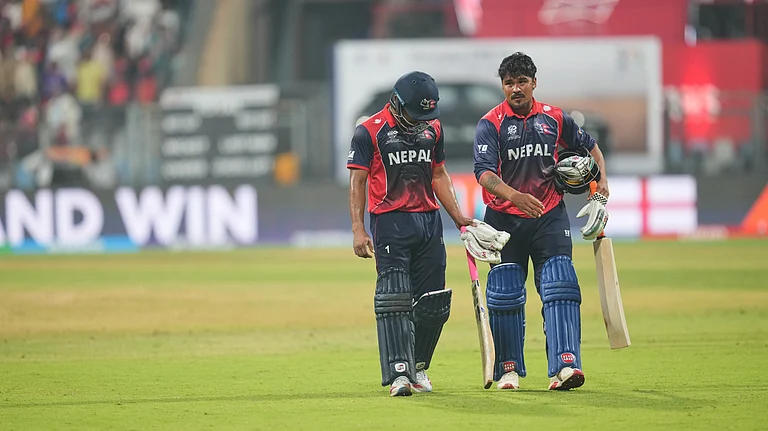His Name Is Khan

My return to Moscow, first in a decade, was not without its moments of nostalgia. One’s liking for a city is not a superficial, impersonal response to monuments, markets and museums. It deepens in direct proportion to the number of friends one has in the city. My anchor in Moscow for decades (as of most Indian journalists and scholars) had been Masood Ali Khan, a tall, stooping Pathan born in Bhopal, junior to the late Prof Nurul Hasan at Allahabad University, announcer at All India Radio, transferred to the bbc Urdu service in London. Somewhere down the line Masoodbhai became an ardent Communist, met secretary-general of the British Communist Party Rajni Palme Dutt and moved to Czechoslovakia at the behest of the Cominform. In Prague, he married Tatia, a bright young Russian working for the Resistance during the Hitler years. The Communist Party of India shifted him to Moscow as the special correspondent for New Age, the party organ. There was no looking back for Masood. He became the toast of every intellectual get-together in the Soviet capital, the city’s most well-informed journalist, with access to members of the central committee. It is hard to believe that this most delightful of men spent his last years in penury. When the rouble crashed following the Soviet collapse, people with limited savings were left with scraps of paper.
When sorrows come, they come in heaps. His family turned on him for not having done enough for them when he had access to people like Khrushchev. In his one-room apartment, Masood slept on a plank of wood over a box filled with his lifelong collection of 33 rpm records of western classical music, a secret passion with him. The solitary toilet had been taken over by his son-in-law as a dark room for his photography. Masood often used the nearby Metro loo to keep peace at home. I hope Ronen Sen will forgive me for telling the story now. It was he as ambassador who made secret arrangements to enable Masoodbhai to keep the wolf from the door—quite literally.
Back In Stalingrad
Masoodbhai believed that Gorbachev was given too much credit for a process set into motion by Khrushchev when he embarked on de-Stalinisation. Stalin’s statues were removed. His body was removed from the mausoleum where Lenin to this day rests. Try talking about “Stalin’s follies” today! Your tourist guide will snap back, as she did with me: “Stalin built our nation!” And, lo and behold, Moscow authorities have restored the words deleted from the national anthem at Khrushchev’s behest: “Stalin raised us to be loyal to the nation: he inspired us to work and be heroic.” The central dome at Moscow’s monumental Kuruskaya metro station once had those words inscribed in gold. They were removed in 1961. Suddenly, along with the station’s restoration, the words are back exactly where they once were. There are two possible messages in all this: resurgent Russian nationalism is tied up with Stalin’s aura. Also Russians wish to rub in the point: history’s most famous Georgian is Stalin, not Georgia’s President Saakashvili!
Tell Tchaikovsky The News
To paraphrase Shakespeare, some good can be extracted even from the worst of circumstances. During Soviet days, one always had a chaperon, guide or minder in attendance. If one happened to be a Soviet guest, say, for 10 days, the guide was by one’s side every waking minute. It was impossible not to strike some sort of a personal rapport with him. All hotels had duty-free shops on the ground floor with half-empty shelves—all very spartan. On the last day, after much hesitation, he would ask for a favour: 33 rpm records or cassettes of classical operas, symphonies and concertos, available at the duty-free shop. The moral of the story is simple: the controlled Soviet society did not have access to pop, jazz and hard rock, considered symbols of capitalist decadence. So they fell back on their classics, in music, dance and literature. The result is that most Russians know their Tchaikovsky, Chekhov, Tolstoy and Anna Pavlova.
Dance Li’l Lady
The love for classics in the old system was obviously for want of other options. After all, artistes like Rudolf Nureyev defected from the Soviet system. In fact, I was privileged to see him perform not at the Bolshoi but in front of the Louvre in Paris. It was an evening of unspeakable enchantment. This defection notwithstanding, the Bolshoi ballet remained one of the world’s premiere cultural addresses.
These days the original Bolshoi is under repairs but there is quite as much public pressure in the ballet’s temporary new abode nearby, the one where Hillary Clinton spent an evening, and where PM Manmohan Singh will surely be a guest when he visits in early December. Muscovites claim their city is 900 years old. It would be nice to know world cities—and there must be dozens—which are older. All I know is this: the toss-up between the world’s oldest continuing habitation is between Damascus and Varanasi.






















